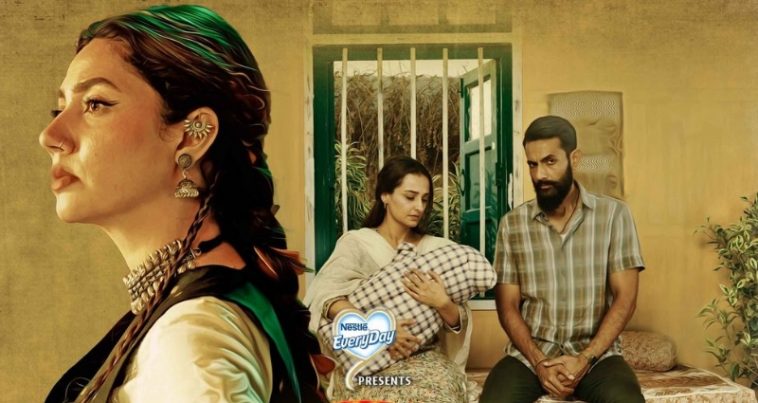Mahira Khan’s returning to the TV screen is nothing less than a treat. The first look and initial promos of ‘Razia’ made us feel that Khan is playing the titular role. But that wasn’t the case. She headlines the mini-series as the narrator, with Mohib Mirza and Momal Sheikh in important roles. So does ‘Razia’ succeeds in giving viewers a good time. Let’s Analyze…
What ‘Razia’ Is All About?
Celebrations are canceled, charity is halted, and caterers are called off as a daughter is born in the family of patriarchs. This is how Saleem (Mohib Mirza) embraces parenthood and welcomes his first child ‘Razia’. His mother played by Parveen Akbar labels daughters as ‘burdens’ and sons as ‘arms’ to fathers. Razia grows up in the guilt of being an unwanted child in the family. The negligence towards her worsens with the arrival of his brother Ali.
Saleem goes all out to celebrate this big day while Razia is being sidelined in a corner. Surprisingly, Saleem’s mother who was waiting for this moment passes away suddenly before holding Ali in her arms. Ali is given preference over Razia, be it his birthday celebrations, playing with new toys, or riding a bicycle. Razia wants to ride Ali’s bicycle but isn’t allowed to do so. She realizes that she is of no value until she meets Mannu, a young boy in the neighborhood whom she becomes friends with.
Razia wins a bicycle hidden in cola caps. As time passes, she turns ten and aims to participate in an international cycling contest to win a gold medal. Sadly her dream is shattered by Saleem who restricts her to sit in the house as she is grown up. Adding more to the horror she isn’t allowed to eat the chicken drumstick as it is only to be eaten by the males of the family. Razia is confused and questions her father about inequality, resultantly she gets slapped by him.
Mohsin Ali’s Delicious Double Treat
Writer and director Mohsin Ali packs a solid punch in both departments. His script is bold and applause-worthy. He succeeds in showcasing how patriarchy is deeply embedded in our psyche, not just in men but women also. The dialogues and one-liners are sharp, witty and add to the impact. But at some places, lines like Piece Bara Tight Hai or Kab Tak Tangon Ke Biche Se Sochay Ga, etc. were too bold and should have toned down for prime-time viewing. Also, why was Mahira speaking a lot of English words while addressing a public crowd?
Ali’s directions are equally good. He hasn’t just written a good script, but his execution is top-notch. He does a fine job in scenes like Mahira’s introduction, Saleem’s mother suddenly passing away, Saleem restricting Razia from playing with Ali’s belongings and Razia not having food when her mother stops her from eating the drumstick. The proceedings in the first episode were watertight, episode two was relatively slow but the scenes in it were important to explain how Razia’s life has been impacted by the negligence of her family.
Performances Mai Dum Hai
We have seen Mahira Khan in challenging parts before but here she surprises viewers with her bold and fearless avatar. Khan as the narrator handles a difficult part with great ease, without going overboard. She hits it out of the park with her long monologues with total command over her expressions and body language. Her star power surely makes Razia more accessible to the masses.
Mohib Mirza shines as the sick-minded patriarch. He is damn good in scenes where he tells the doctor to save the child (if male) over his wife; also in the sequence where he celebrates the birth of a baby boy. His body language and expressions are on point. Momal Sheikh has a fine screen presence and puts up a decent act. We hope to see more of her in the upcoming episodes. Parveen Akbar leaves a mark in a small appearance. The child actors who play Razia are commendable.
Can’t Wait To Savour It All
Razia takes a solid start and addresses patriarchy in the wittiest way possible. Laced with powerful performances by the leads, the miniseries is sure to be loved and adored by its target viewers – the masses.



Comments
0 comments